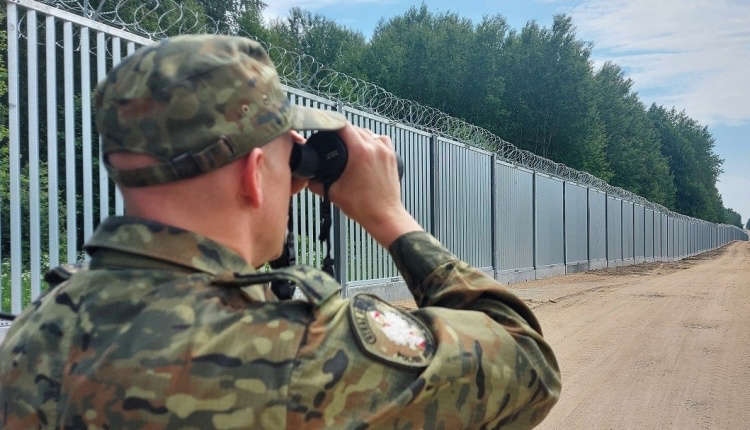The chief commander of the Border Guard has appealed to the Ministry of Defense to relocate an additional 10,000 soldiers to the Polish-Belarusian border.
Deputy Minister of Internal Affairs Maciej Wąsik, at a conference with the head of the Border Guard General Tomasz Praga, stressed that the migratory pressure at the border with Belarus is still increasing. The entire procedure, as he said, is organized by the Belarusian border guards.
Minister Wąsik explained that aggression against Polish Border Guard officers, Polish soldiers, and police officers is increasing at the border with Belarus; they are being pelted with bottles, stones, and branches. He cited examples of attacks on Polish patrols, including a June incident when an object was shot from the Belarusian side, possibly using an airgun or firearm, smashing the windows of a Border Guard vehicle.
Wąsik also pointed out that, to enable migrants to pass, Belarusian services try to damage the border barrier using, for example, power tools.
“We need more forces on the border. The chief commander of the Border Guard appealed to the Ministry of National Defense to move another 10,000 soldiers to the Polish-Belarusian border,” said Wąsik. Currently, the Border Guard’s operations on the border are supported by around 2,000 soldiers.
In the opinion of the chief commander, Poland is dealing with another stage of hybrid warfare at this border. As General Praga pointed out, unlike before, immigrants are grouped in Belarusian border posts or in their vicinity. When the Belarusian side deems that an attempt to cross the border is justified, they transport these people to the border line.
“This year, there were 19,000 attempts to illegally cross the Polish-Belarusian border. For all of last year, it was just under 16,000. In July this year, a record was reached ‐ in this month, almost 4,000 people tried to get through,” General Praga reported. He added that such numbers were last reached in 2021 at the beginning of the crisis.
According to the Border Guard, recently the majority of foreigners arrive in Belarus through Russia. The head of the Border Guard stressed that every day six to seven trains travel on the Moscow-Minsk-Brest or Moscow-Minsk-Grodno route.
“These trains, in their nomenclature, are called tourist trains,” he added.
The commander noted that border services worldwide should protect the borders. In his opinion, the Belarusian services have become “a regular criminal group that organizes illegal immigration” and “draws huge profits from it.” Per what he has seen, nothing happens without the knowledge and consent of Minsk.






